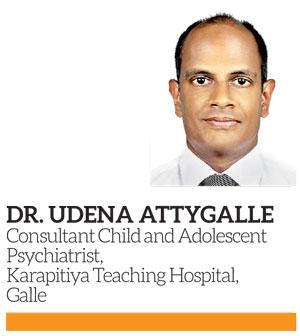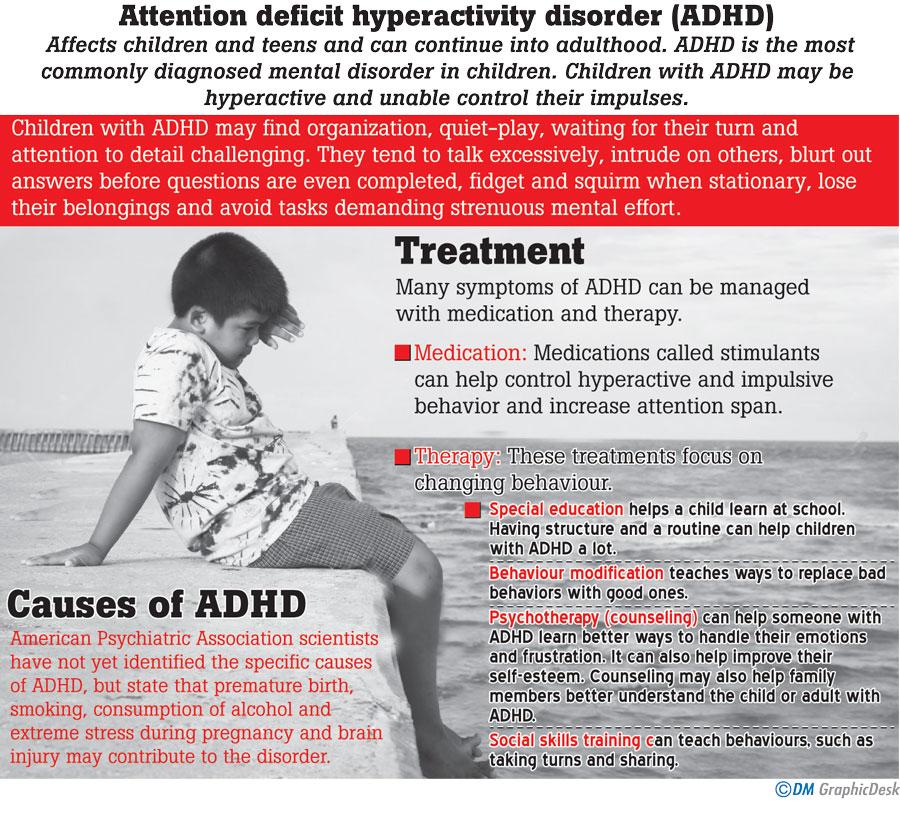Reply To:
Name - Reply Comment
Last Updated : 2024-04-26 20:44:00

Understanding, diagnosing and treating the condition
 The term ADHD is undoubtedly one that is thrown around as a label for a difficult, troublesome child. It is also misunderstood for hyperactive, spurts of energy and referred to in most cases of inattention.
The term ADHD is undoubtedly one that is thrown around as a label for a difficult, troublesome child. It is also misunderstood for hyperactive, spurts of energy and referred to in most cases of inattention.
However it is more complex than this. The American Psychiatric Association calls it the Attention-deficit hyperactive disorder (ADHD) and the International Classification of Mental and Behavioural Disorders (ICD-10) refers to it as hyperkinetic disorder.
This neuro developmental issue that is most common among children has observed an upward trend as of recent past. This comes as no surprise with our lifestyles being subjected to faster paces and growing pressures of urbanization.
Dr. Udena Attygalle, Consultant Child and Adolescent Psychiatrist at the Karapitiya Teaching Hospital described how the presently increased demand for attention, the rush for time and the existing education system involving long, stationary hours of study have increased the vulnerability to ADHD in both children and adults.
What is ADHD? 
Clarifying previous misconceptions, Dr. Attygalle explained that ADHD is in fact a composite neurodevelopmental issue involving multiple challenges.
“What ADHD basically entails is a difficulty in regulating attention, activity and impulsiveness. Among these key areas various difficulties may be endured. In terms of attention, tasks requiring much focus, forgetfulness and easy distractions are challenges. Hyperactivity may manifest in the inability to remain seated, walking around the classroom, jumping into the middle of conversations and then impulsivity may be seen when acting without thinking.”
Signs
ADHD does not by any means undermine a child’s intelligence. As Dr.Attygalle pointed out, ADHD only challenges intelligent children from performing well in the classroom. It is therefore vital that as parents and teachers, one must observe the characteristics of such children.
“Before the school going age, hyperactivity is prominent. When you compare them with children of the same age, you have trouble keeping them in one place, they’re more disruptive, running around breaking things, always on-the go. Then when school starts, it’s the attention problem that comes to light, because teachers notice that - despite being intelligent kids they lose interest fast, they’re quickly distracted and thus have falling grades. It only gets more complex as you age.”
Furthermore, children with ADHD may find organisation, quiet-play, waiting for their turn and attention to detail challenging. They tend to talk excessively, intrude on others, blurt out answers before questions are even completed, fidget and squirm when stationary, lose their belongings and avoid tasks demanding strenuous mental effort.
Causes
In terms of it being genetic, Dr. Attygalle expressed that, “It is not straight-forward, but it has a huge heritability, meaning that it has a sizeable genetic contribution to its cause.” This does not mean that if a father or sibling is diagnosed with ADHD, other children have it too, it is a more complex phenomenon.
It is also more commonly found in males, at a ratio of 4:1
According to the American Psychiatric Association, scientists have not yet identified the specific causes of ADHD, but state that premature birth, smoking, consumption of alcohol and extreme stress during pregnancy and brain injury may contribute to the disorder.
Adults with ADHD
Although we usually associate this disorder with children, it is in fact one that may develop and seep into ones adulthood.
“Sometimes, we get adolescents coming for the first time with issues. It is a life- course disorder. It goes into adulthood. The hyperactivity seen in the child may dissolve around ten or eleven and most adults with the condition then suffer from the inattention aspect.”
Although it may ‘develop’ with one’s growth, this isn’t the same as with a common cold, Dr. Attygalle explained. The difficulties one dealt with in a classroom will then manifest within your work environment and new challenges are endured.

Treatment
Treatment for ADHD is a multifold process involving behavioural therapy, self-regulation, possible medication and the role of parents and teachers.
“ A major part of treatment is psychological education because secondary problems like rejection, being labelled in school cause some to get depressed and lose confidence,” Dr. Attygalle described. This aspect of treatment involving awareness and conversation thus enables a careful coordination of behaviour and an encouragement of good choices in children.
He next described the medication aspect, which is only prescribed on the severity of the condition and the level of necessity.
“Certain medication that helps rebalance specific chemicals in your brain helps you to regulate yourself for certain periods of time, keeping your attention in one place.”
Certain other interventions also exist. Like “environmental modifications that alter your surroundings to better accommodate these kind of issues both at school and at home. There are also behavioural inputs which teach better response to such children so that their behaviour does not escalate.” It is therefore important to associate positivity and understanding when handling such cases.
Children who have ADHD tend to find structure, routines and clear expectations easy to grasp. As a parent to such a child, one may find that organized schedules, simple and demonstrated instructions, undivided focus when speaking to him/her being effective. Furthermore, maintaining regular communication with the child’s teacher, supervision and rewarding good behaviour are also recommended.
ADHD is not an issue that one should fear nor ignore. With increased awareness, more children are being diagnosed instead of fruitlessly labelled; they are appropriately monitored, regulated and treated, expanding their chances of integrating into society as useful adults.

Add comment
Comments will be edited (grammar, spelling and slang) and authorized at the discretion of Daily Mirror online. The website also has the right not to publish selected comments.
Reply To:
Name - Reply Comment
US authorities are currently reviewing the manifest of every cargo aboard MV
On March 26, a couple arriving from Thailand was arrested with 88 live animal
According to villagers from Naula-Moragolla out of 105 families 80 can afford
Is the situation in Sri Lanka so grim that locals harbour hope that they coul

2 hours ago
4 hours ago